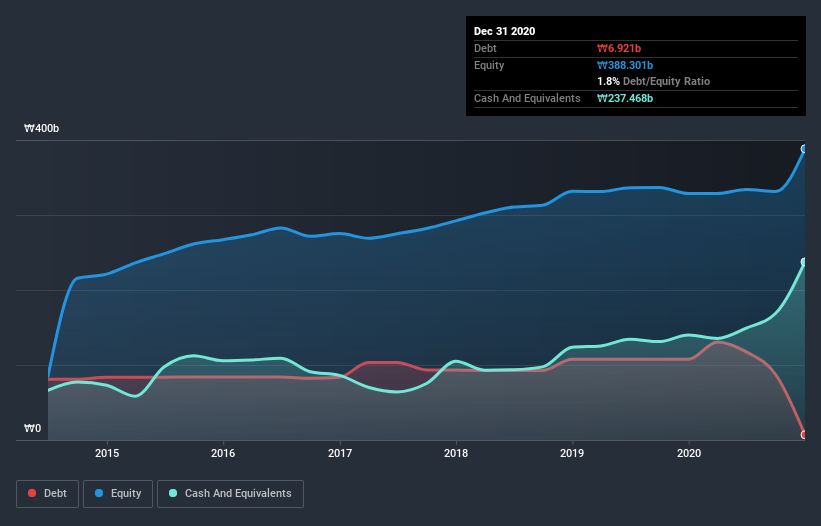
The external fund manager backed by Berkshire Hathaway's Charlie Munger, Li Lu, makes no bones about it when he says 'The biggest investment risk is not the volatility of prices, but whether you will suffer a permanent loss of capital.' So it seems the smart money knows that debt - which is usually involved in bankruptcies - is a very important factor, when you assess how risky a company is. As with many other companies Eusu Holdings Co., Ltd. (KRX:000700) makes use of debt. But should shareholders be worried about its use of debt?
When Is Debt A Problem?
Generally speaking, debt only becomes a real problem when a company can't easily pay it off, either by raising capital or with its own cash flow. Part and parcel of capitalism is the process of 'creative destruction' where failed businesses are mercilessly liquidated by their bankers. While that is not too common, we often do see indebted companies permanently diluting shareholders because lenders force them to raise capital at a distressed price. Of course, debt can be an important tool in businesses, particularly capital heavy businesses. The first step when considering a company's debt levels is to consider its cash and debt together.
See our latest analysis for Eusu Holdings
How Much Debt Does Eusu Holdings Carry?
The image below, which you can click on for greater detail, shows that Eusu Holdings had debt of ₩6.92b at the end of December 2020, a reduction from ₩107.6b over a year. However, its balance sheet shows it holds ₩237.5b in cash, so it actually has ₩230.5b net cash.

A Look At Eusu Holdings' Liabilities
The latest balance sheet data shows that Eusu Holdings had liabilities of ₩99.2b due within a year, and liabilities of ₩10.8b falling due after that. Offsetting these obligations, it had cash of ₩237.5b as well as receivables valued at ₩67.5b due within 12 months. So it can boast ₩195.0b more liquid assets than total liabilities.
This surplus suggests that Eusu Holdings has a conservative balance sheet, and could probably eliminate its debt without much difficulty. Simply put, the fact that Eusu Holdings has more cash than debt is arguably a good indication that it can manage its debt safely. When analysing debt levels, the balance sheet is the obvious place to start. But it is Eusu Holdings's earnings that will influence how the balance sheet holds up in the future. So when considering debt, it's definitely worth looking at the earnings trend. Click here for an interactive snapshot.
Over 12 months, Eusu Holdings made a loss at the EBIT level, and saw its revenue drop to ₩335b, which is a fall of 8.5%. That's not what we would hope to see.
So How Risky Is Eusu Holdings?
While Eusu Holdings lost money on an earnings before interest and tax (EBIT) level, it actually booked a paper profit of ₩80b. So when you consider it has net cash, along with the statutory profit, the stock probably isn't as risky as it might seem, at least in the short term. With mediocre revenue growth in the last year, we're don't find the investment opportunity particularly compelling. When analysing debt levels, the balance sheet is the obvious place to start. However, not all investment risk resides within the balance sheet - far from it. We've identified 2 warning signs with Eusu Holdings (at least 1 which shouldn't be ignored) , and understanding them should be part of your investment process.
When all is said and done, sometimes its easier to focus on companies that don't even need debt. Readers can access a list of growth stocks with zero net debt 100% free, right now.
If you decide to trade Eusu Holdings, use the lowest-cost* platform that is rated #1 Overall by Barron’s, Interactive Brokers. Trade stocks, options, futures, forex, bonds and funds on 135 markets, all from a single integrated account. Promoted
Valuation is complex, but we're here to simplify it.
Discover if Eusu Holdings might be undervalued or overvalued with our detailed analysis, featuring fair value estimates, potential risks, dividends, insider trades, and its financial condition.
Access Free AnalysisThis article by Simply Wall St is general in nature. It does not constitute a recommendation to buy or sell any stock, and does not take account of your objectives, or your financial situation. We aim to bring you long-term focused analysis driven by fundamental data. Note that our analysis may not factor in the latest price-sensitive company announcements or qualitative material. Simply Wall St has no position in any stocks mentioned.
*Interactive Brokers Rated Lowest Cost Broker by StockBrokers.com Annual Online Review 2020
Have feedback on this article? Concerned about the content? Get in touch with us directly. Alternatively, email editorial-team (at) simplywallst.com.
About KOSE:A000700
Eusu Holdings
Through its subsidiaries, provides third-party logistics services worldwide.
Flawless balance sheet with acceptable track record.
Market Insights
Community Narratives



